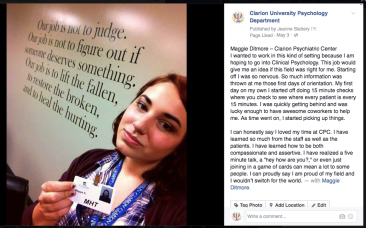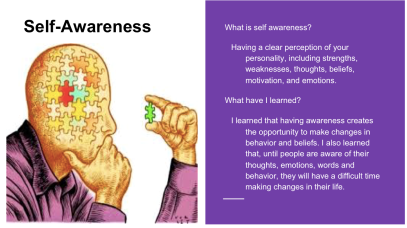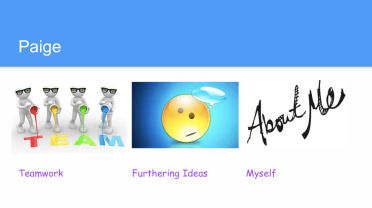– Jeanne M. Slattery
The end of the semester is a time for reflection.
My final class assignment is often some type of reflection about the semester. In my internship course, I ask my students to evaluate their experiences both for our department Facebook page and more formally in a Discussion Board shared with the class. See Figure 1. In my Intro to Counseling class, students write self-evaluations at the beginning and end of the semester, describing what they want to learn in the semester and then how they’ve grown over the course of the class. As I described in an earlier post, my Senior Seminar students begin the semester by evaluating their learning over the course of their entire college career. In a more relaxed setting at the end of the term, those same students reflect aloud on their semester: what worked, what didn’t, and what I should do differently next time.
In my lower-level courses, I ask my students a somewhat simpler question: What did they learn this semester? I asked my freshmen in my inquiry seminar, for example, to identify the most important things they’d learned and to communicate these in a group presentation. See Figures 2 and 3. Perhaps in the future, I’ll allow students to do a skit, poem, song, or dance, but for now, just a presentation.
Why do I give these assignments? At least four reasons. First, I want my students to consolidate their learning over the course of the semester, so they recognize what they have learned. Second, in classes like Intro to Counseling, as Emily Cornman describes here, I use this reflection as a type of formative assessment to help my students recognize their strengths and weaknesses, as well as identify growing points for the future:
When I was scheduling classes for this semester my advisor, Dr. Slattery, suggested I take this course. I had told her about my desire to be a statistician for psychological research and expressed that I had little interest in being a therapist. I felt I would not perform well as a therapist because I did not think I had the skills to do so. In the past, I have had trouble with empathizing with others, especially those I could not easily relate to. Also, I had difficulty listening to others and being insightful about what they were saying…. Not only has this course helped me improve upon the previously mentioned weaknesses I would have had as a therapist, but it has also inspired me to consider becoming a therapist. I have realized, it was not that I was incapable of these skills, I was just not educated on how to acquire them. – Emily Cornman, Intro to Counseling, Fall 2015
Third, while I use such assignments to help my students learn and understand themselves, they help me recognize what my students are learning and what I need to work on further. In the Fall 2015, most of my student groups referred to the Wellness Wheel in their presentations, but not to PERMA. I wasn’t entirely surprised, as the Wellness Wheel focuses on concrete behaviors – in the physical, emotional, spiritual, intellectual, career, and social domains – while Seligman’s (2011) description of PERMA emphasizes how one lives (i.e., feeling positive emotions, engaging, fostering relationships, finding meaning, and having a sense of accomplishment). This is a more abstract, thus more difficult, way of thinking about wellness, but an approach that I think is ultimately more important. In Spring 2016, I changed my approach to discussing wellness. When my students talked about both the Wellness Wheel and PERMA during their presentations, I concluded we’d discussed wellness more effectively that semester.
When students only talk about content discussed in our course, I am disappointed, as that sort of discussion usually requires only a superficial analysis of what we did. In my inquiry seminars, for example, I asked my students to develop habits of mind that are often difficult for freshmen, but that can be helpful in the future (e.g., questioning, reflection, analysis, teamwork, self-observation). I want them to recognize these habits of mind as important to what we did that semester.
At their mid-semester evaluation, a number of my inquiry seminar students complained about their journals: too much writing, too frequent writing. I was tempted to cut back on this assignment, but the abilities to introspect, to develop ideas, and to observe and write about observations are skills that are important in psychology. Paige and I argued about her writing for most of the semester: she initially resisted developing her ideas (giving me a two sentence response when I asked for an essay). Her response at the end of the semester brought me to tears. See Figure 3. Similarly, Antonia entered the semester resistant to school and to psychological ideas – and she hated journals. See Figure 2. That she said that journals were valuable, as was the reflection done in them? Priceless.
Finally, I ask my students to reflect on their work at the end of the semester because I want them to begin to own their learning and to perceive themselves differently as a learner and a person. I am different now than when I started. I can do things that I thought were impossible. I am capable of growing and changing.
When I first started teaching, I didn’t use such assessment strategies in my teaching. I didn’t consider the skills I was teaching and, instead, focused on the content. I didn’t think about changing my course from one semester to the next based on what I’d learned from the first course. I now think about my teaching very differently – I’m less of a Sage on the Stage. I expect to learn from my students, and the assignments described here have helped me do so. I encourage you to explore similar opportunities to reflect on each semester’s work and integrate learning – both for yourself and for your students.
References
Seligman, M. E. P. (2011). Flourish: A visionary new understanding of happiness and wellness. New York, NY: Simon and Schuster.
Jeanne M. Slattery is a professor of psychology at Clarion University. She loves teaching and learning and describes herself as a learner-centered teacher. She has written three books: Trauma, meaning, and spirituality: Translating research into clinical practice; Counseling diverse clients: Bringing context into therapy; and Empathic counseling: Meaning, context, ethics, and skill. She can be contacted at jslattery@clarion.edu




Excellent, Jeanne! One question, though: what is “PERMA”? Not being familiar with that term, I did not fully understand the paragraph about it (and the “Wellness Wheel”). Happy end of the semester!!
LikeLike
Good question! The Wellness Wheel focuses on concrete behaviors (i.e., in the physical, emotional, spiritual, intellectual, career, and social domains). Seligman (2011) uses PERMA as short hand for a style of effective living (i.e., feeling Positive emotions, Engaging, fostering Relationships, finding Meaning, and having a sense of Accomplishment). Thanks!
LikeLike